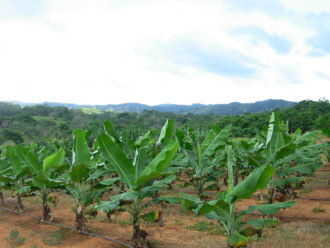GURABO, Puerto Rico -- In humid, tropical environments where soil organic matter decomposes at a rapid rate, efforts are being made to maintain and improve soil health using cover crops, specifically in high intensive cropping systems like plantain production.
In a Producer Grant project, farmer Duamed Colon-Carrion studied the potential benefits of cover crops on soil quality. Using soil health indicators: recalcitrant soil organic matter (RSOM), dehydronase activity (DHA), and soil microbial biomass (SMB) as markers, Colon-Carrion interplanted various mixes of jack bean, sunnhemp and sorghum in a plantain plantation.
Recalcitrant soil organic matter is part of the soil organic matter that resists microbial decomposition. Soil microbial biomass is a function of the overall soil biota. Dehydronase activity involves soil enzymes that oxidize organic matter and is a good indicator of soil quality. The goal of the project was the determine if the cover crops could improve soil health, indicated through an increase in RSOM, SMB and DHA.
Results showed an increase in all three soil health indicators, demonstrating the benefits of the cover crops on soil health. The most successful cover crop was jack bean, followed by sunn hemp.
Additional advantages to using the cover crops were also found beyond improved soil health: nematode suppression in plantains, reduced chemical fungicide applications, and high quality, marketable plantain yields.
Published by the Southern Region of the Sustainable Agriculture Research and Education (SARE) program. Funded by the USDA National Institute of Food and Agriculture (NIFA), Southern SARE operates under cooperative agreements with the University of Georgia, Fort Valley State University, and the Kerr Center for Sustainable Agriculture to offer competitive grants to advance sustainable agriculture in America's Southern region. This material is based upon work that is supported by the National Institute of Food and Agriculture, U.S. Department of Agriculture, through Southern Sustainable Agriculture Research and Education, under sub-award number: FS13-271. USDA is an equal opportunity employer and service provider. Any opinions, findings, conclusions, or recommendations expressed in this publication are those of the author(s) and do not necessarily reflect the view of the U.S. Department of Agriculture.
